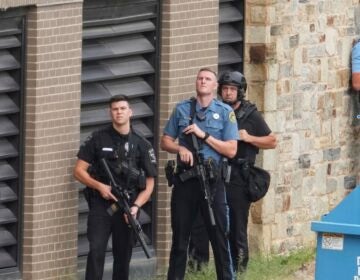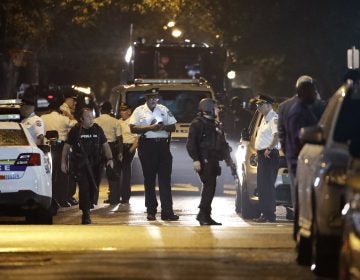Could piecemeal gun control measures have stopped North Philly gunman?
Maurice Hill, who wounded six Philadelphia police officers, had a long history of gun violations, but was still able to obtain an AR-15.

Police cordon off a large area aroung Broad and Erie streets after a gunman opened fire and held police at bay for seven hours. (Emma Lee/WHYY)
It’s not clear how many weapons 36-year-old gunman Maurice Hill had — or where he got them — when he fired hundreds of rounds Thursday night, injuring at least six police officers in Philadelphia’s Nicetown-Tioga neighborhood.
What is clear is that his extensive criminal history should have prevented Hill from owning a gun.
Police Commissioner Richard Ross confirmed Thursday that Hill likely used an AR-15 assault rifle. He also had a handgun, which was in his pocket when he surrendered to police late Wednesday night after a seven-hour standoff. Beyond that, Ross said, officers will have to wait until they gain access to the building where the incident occurred. As of Thursday afternoon, they had not gotten in, he said, because the tear gas police deployed the night before had not yet dissipated.
Dating back to 2001, when he turned 18, Hill’s criminal record includes dozens of charges ranging from narcotics possession, to kidnapping and attempted murder. He was convicted of felonies for aggravated assault and perjury.
In 2002, Hill pleaded guilty to four firearms violations, including carrying a firearm without a license, in a public place, and without a serial number, and was sentenced to a minimum of nine and a maximum of 18 months in prison, plus two years’ probation. He was charged over the years with at least 20 other firearms violations, which were either adjudicated or not pursued by the District Attorney’s Office.
A profile like this is not uncommon. According to the FBI, of the more than 530 people who killed police officers between 2009 and 2018, 40% had been arrested for weapons offenses.
Local and state officials have put forward a range of initiatives in recent months designed to keep guns out of the hands of those who shouldn’t be allowed to have them.
In June, Mayor Jim Kenney announced that 47 different neighborhood groups would receive a total of $700,000 from the city’s Office of Violence Prevention to combat community violence.
Last month, Pennsylvania Attorney General Josh Shapiro launched the Track and Trace initiative, which aims to work with law enforcement to ensure that guns used in crimes are entered into a database, so their source can be traced. The office said it would work with gun retailers to ensure that they keep digital records of sales. Shapiro also launched an initiative that attempts to limit straw purchasing among women — a practice that research shows is common.
Shapiro was not available Thursday to explain how any of those initiatives might have prevented someone like Hill from obtaining weapons.
In Harrisburg, recent efforts at passing gun control measures in the state legislature have not succeeded. During a press conference Thursday afternoon, Democratic State Sen. Sharif Street listed a handful of bills that couldn’t get a vote during the last session, ranging from universal background checks, to a ban on assault weapons, to a requirement that those applying for concealed-carry permits receive safety training.
“The Commonwealth of Pennsylvania has not done everything we are supposed to do,” Street told reporters and other elected officials in an impassioned speech. “We are derelict in our duties, and it is because the majority caucus is afraid of the NRA. They refuse to call a vote on this legislation.”
The City of Pittsburgh passed a municipal assault-weapons ban in the aftermath of the Tree of Life Synagogue massacre, and the National Rifle Association promptly filed suit.
In response to legislative inaction, Gov. Tom Wolf had been scheduled to announce an executive order Thursday that would have set up new initiatives focused on greater oversight and data sharing, but the announcement was postponed to Friday because of Wednesday’s police shootings in Philadelphia.
Though local measures may chip away at gun crime, national policy researchers say the change must happen on a federal level to create a uniform process and prevent people from getting firearms across state lines. Universal background checks would do that, according to David Chipman, senior policy adviser at Giffords, an anti-gun violence organization founded by former U.S. Rep. Gabrielle Giffords.
“Limiting the ability to buy a gun to only a licensed gun dealer, where records would be kept and a background check passed, is important not just because it would prevent criminals from going in and buying a gun, but it allows crime guns to be traced,” said Chipman, who was an agent with the federal Bureau of Alcohol, Tobacco, Firearms and Explosives for 25 years. “There’s no incentive to travel to any other state if the rules are the same.”
Chipman said that while the broader issue is gun control as a whole, limiting the type of weapon used in an incident like the one here Wednesday would have made an enormous difference.
“There’s no .38 caliber cheap revolver that would’ve kept the Philly PD at bay for the entire evening, nor shoot six officers, I promise you,” Chipman said. “The reason that incident played out was because of the rifle used, period, the end.”
WHYY is your source for fact-based, in-depth journalism and information. As a nonprofit organization, we rely on financial support from readers like you. Please give today.





